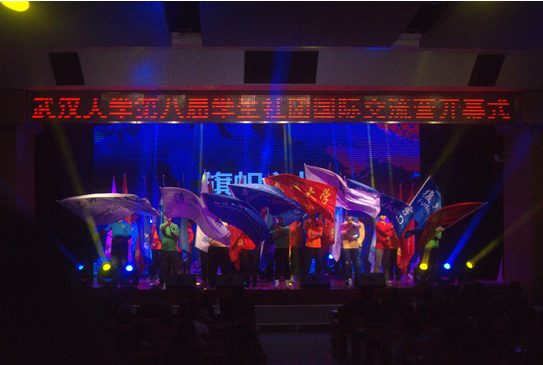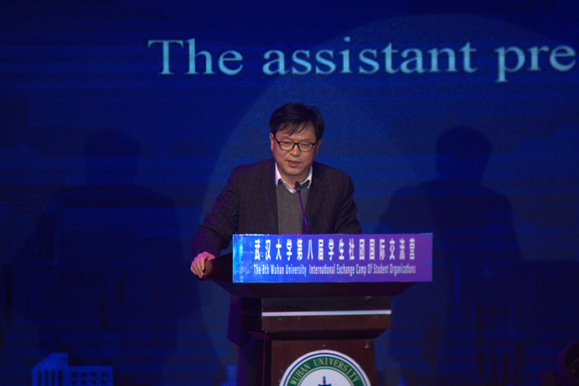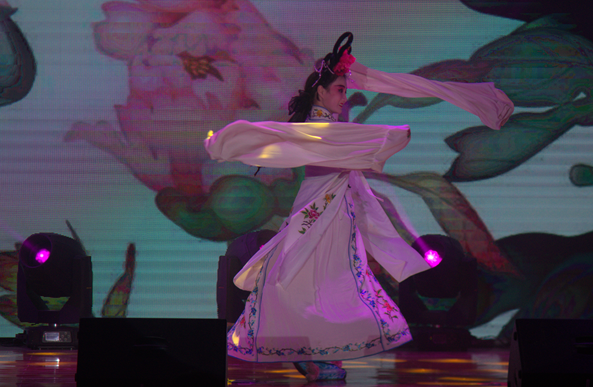On November 26th, the opening ceremony of the 8th Wuhan University International Exchange Camp of Student Organizations was held in Wuhan University Humanities Museum on the theme of “Youth Creates Future”. More than 200 elites from world-renown universities, such as Harvard, Columbia, Stanford and Tsinghua University, gathered together for the purpose of broadening horizon and strengthening the bond with each other.

Flags admission
The 8th Wuhan University International Exchange Camp of Student Organizations serves as an important platform for students from all over the world to promote their communication and develop individual’s capacity through its carefully-designed conferences and workshops. “The future of our nations depends on the youth generation who have ideals, abilities and responsibilities.” Chen Huidong, assistant to the president of Wuhan University, quoted a saying from President Xi and expressed his expectation for all the participants, “I hope you can be spreaders of culture who have both ability and strict morality, with spirit of innovation and practice.”

Chen Huidong, assistant to the president of WHU, delivering a speech
Then, as the representatives of campers, Hugo (Harvard University) from US Ivy League student council, Wu Renwei, from Shanghai Jiao Tong University, Zhao Yeyang, from Union of Student Associations in Wuhan University, delivered speeches respectively. They think that youth generation should undertake their responsibilities and contribute to the society.

Zhao Yeyang, representative of campers, delivering a speech
The performance of students from Wuhan University presented a visual feast for the audience. Dancing, Han Opera, Erhu Unison and Fashion Show, those performances with typical Chinese characters presented the charm of traditional culture and impressed all the audience. The opening ceremony ended with a chorus “Hand in hand”.

Student from WHU performing Han Opera
In the following days, campers from 34 countries and districts, around 50 universities fully immersed themselves in the communication of culture and ideas. Activities in the whole Camp can be divided into two parts: cultural workshops and conferences.
The workshop part started on November 27th and concluded in two days. However, the work shop was a bit different from the last year’s, adding an Chinese Art segment to the other three themes – Chinese Character, Chinese History and Chinese Kungfu.
Bashar, a Syrian camper studying in Chongqing University, told the journalist that he was impressed by the immersive environment of the calligraphy writing module in the Chinese Character Workshop as it created connection between him and the Chinese culture he likes. After the Chinese Kungfu Workshop, East Timer camper Ouyang Hongfei from China University of Geosciences, the champion of the fist position learning module, answered the journalist’s questions in fluent Chinese. For him, what he gained in these cultural workshops was different from his previous experience in the ukelele club in CUG. The integrated activities provided easy access to Chinese culture lovers, no matter Chinese or foreigners, by the means of student organizations and clubs.
The conference part included Model United Nations Conference, “Internet+” Summit of the Youth and A Bright World (a talk show hosts foreigners living in China, holding discussions in Mandarin on various topics and issues). Related organizations and clubs in Wuhan University set the platform for campers to exchange ideas from November 26 to 28. The three conferences included three respective themes: the role of youth in the future of the Paris Agreement, the convenience brought by digital life, and the value of student organizations. At this time, the facility that student organizations of Wuhan University bring to their in-campus members now draws the world’s attention. Awards were presented to outstanding campers at the closing ceremony on Tuesday evening, November 28, announcing the Exchange Camp came to an end at last.
Despite the campers from all over the world, there is another group of people worth mentioning. Organized by staff from Union of Student Associations and numerous clubs in Wuhan University, the Exchange Camp embodies the creativity of Wuhan University students. Huang Jingkang from Wuhan University Shuhua Club expressed his idea of the Exchange Camp. He believes that his work turned out to be fruitful as he saw campers’ enthusiasm for Chinese calligraphy, “It’s exciting to teach those foreigners to write their names in traditional Chinese characters. I’m satisfied that I’ve played a part in the cross-cultural communication.” Yuan Zihan, the staff from Union of Student Associations in WHU, said, “By hosting such an event, Chinese culture has aroused more people’s love for it, and I’m very proud of that.”
After months of effort, the plan of the Exchange Camp was finally hammered out. Times of adjustments and rehearsals foreshowed all the great moments. The success of the 8th WHU International Exchange Camp of Student Organizations gave credit to its theme and slogan “Youth Creates Future”. High praise was received not only by the Exchange Camp itself, but also by the entire student staff behind it. The platform of the Exchange Camp enables students from all over the world to promote their communication and develop individual's ability, meanwhile, the camp organizers benefited from it by organizing and participating in it. Since 2010, the Exchange Camp has been supported by All-China Student’s Federation and IVY Council. It is believed that such event provides the youth generation with opportunity to apply their ability and creativity to initiate a brilliant future.
Photo by Guo Yutong
Edited by Li Yunzhen, Sun Jingyi, Zheng Yayun& Hu Sijia